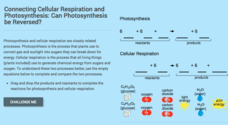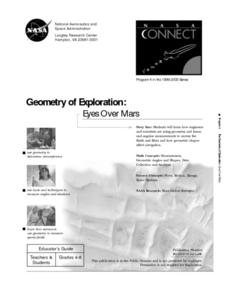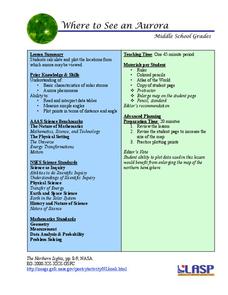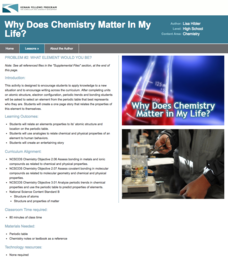CK-12 Foundation
Cellular Respiration: Can Photosynthesis Be Reversed?
Cellular respiration and photosynthesis relate closely, but many don't realize how. Scholars drag and drop the reactants and products to the chemical reactions for both processes. Then they answer three multiple-choice questions.
Virginia Department of Education
Logic and Conditional Statements
If there is a conditional statement, then there is a hypothesis and conclusion. Pupils learn how to identify the parts of conditional statements. Class members continue to work with conditional statements and rewrite them in their many...
Curated OER
Match Shapes in Compositions
Third graders draw shapes that are congruent with each other and identify other congruent shapes. In this congruency lesson plan, 3rd graders also apply specific colors from the color wheel in their shapes.
Curated OER
Bones
Fifth graders observe real bones and models to learn about the structure and function of the skeletal system. In this skeletal system instructional activity, 5th graders manipulate objects and models of bones. They handle real bones and...
Curated OER
The World's Simplest Cartesian Diver
Have your class learn about buoyancy using this simple lesson plan. First, they bring in condiment packets and see what happens when they place it in a glass of water. Then, they use one of the packets to illustrate the concept of a...
Curated OER
Molecular Origami
Learners construct an origami models of different molecules. In this chemistry lesson plan, students explain what expansive soils are made up of. They discuss what happens when this expansive soil expands or shrinks.
Curated OER
Shape Lessons That Connect
Shape lessons provide a way for students to learn about art, science, and math.
Curated OER
Bonding
Students develop an understanding of covalent and intermolecular forces. They are also introduced to ionic bonds, bond length, bond energy, dipole moment, geometry, and Lewis Dot Structure. Students prepare a lecture about bonding...
Curated OER
Animals, Animals, Everywhere
Fourth graders participate in a variety of activities dealing with animal characteristics and classifications in this multi-task instructional activity. They use graphic organizers, make booklets, and make models.
Curated OER
VSEPR THEORY: BALLOONS AND MOLECULES
Students listen to the teacher introduce VSEPR theory and explain molecular geometry. They use balloons to visualize the shape of orbitals. Students create visuals of molecular orbitals with strings and balloons.
Curated OER
Cells: Structures and Processes
Students explore the basic unit of life, the cell in this nine lessons unit. The cell structure of animal and plant cell functions and how they affect our world are probed in this unit.
Curated OER
Layers of the Earth: Plate Tectonics
Sixth graders participate in a lesson that is about investigating the different layers of the earth and defining how the plates move over the mantle. They engage in a variety of activities and use mathematics to create projects to...
Curated OER
Navigating by the Numbers
Students observe how math is important in navigation and engineering. They study how surveyors use math and science to calcute, count, measure, label, and indicate distances on a map. They estimate specific distances.
Curated OER
Killer Wrapper
Learners examine the importance of food safety and the impact it has on their lives. In this health lesson students complete an oral report on food poisoning and design a low cost "safe" packing material for bread.
Curated OER
Geometry of Exploration: Eyes Over Mars
Students research how engineers and scientists generate linear and angular measurements with geometry to survey the Earth and Mars. They assess how geometric shapes affect navigation. A surveyor comes to the classroom and explains how he...
Curated OER
Indoor and Outdoor Patterns
Students explore geometry by participating in a visual illustration activity. In this pattern identification lesson plan, students explore inside their classroom and discuss patterns they find while tracing them on paper. Students attend...
CK-12 Foundation
Simplification of Radical Expressions: Richter Scale Exponents
Shake up your lessons with with a radical resource. Scholars use a slider to view the Richter scale magnitude and amplitude of historical earthquakes. They use powers of 10 to compare the amplitudes of different earthquakes.
PHET
Soda Bottle Magnetometer
Introduce learners to set of complete instructions that describe how to build a magnetometer that works just like the ones professional photographers use to predict auroras. The diagrams are wonderfully descriptive, and the written...
National Institute of Open Schooling
Chemical Bonding
Name is Bond, covalent bond. Through readings and answering questions, classes explore the different types of chemical bonds, their characteristics, valence shell electron pair repulsion theory, and atomic orbitals.
PHET
Where to See an Aurora
Where can you see an aurora in North America? After completing an astronomy activity, scholars can locate the exact coordinates. Pupils plot points of the inner and outer ring of the auroral oval and answer questions based on...
Alabama Learning Exchange
Coordinate Geometry
Where do the coordinates lead? As children brainstorm ways to find the location of different buildings, they learn about coordinate points and how to use them to locate areas on a grid or map. They practice using ordered pairs by playing...
Kenan Fellows
What Element Would You Be?
Primo Levi wrote a collection of short stories comparing his life from Italy to Auschwitz to elements in the periodic table. Pupils read an excerpt from his book and research the characteristics of various elements. Then, they make a...
Curated OER
Measuring the Earth
Young scholars use principles of geometry to measure the circumference of the Earth. In this applied geometry lesson, students use mathematics to determine scientific information. They make measurements, calculate the central angle,...
Curated OER
Properties of Parallelograms
Scholars explore parallelograms in this geometry lesson. They investigate the properties of a parallelogram. Assisted by technology, your learners will construct a parallelogram and examine the sides, angles, and diagonals to discover...

























